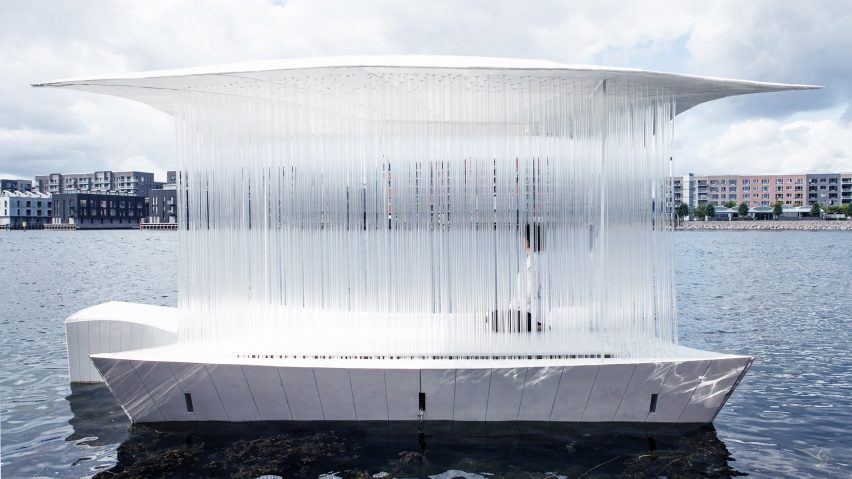London architecture studio Pan Projects has designed Teahouse Ø as the first in a series of floating pavilions aimed at opening up Copenhagen's canals to the public.
Created with Danish designer Helene Christina Pedersen, Teahouse Ø was informed by the way in which the surface of the water changes, reflecting both its surrounding environment and the seasons.
Made in a local Copenhagen workshop, the roof and base of the teahouse were made with a wood structure clad in fibre-reinforced, plastic-covered styrofoam.
Numerous transparent, acrylic tubes were suspended from its roof to create an effect that resembles running water.
"We wished to create a space that is completely covered with such a beautiful surface – that led us the idea of using transparent acrylics as the wall and columns," said Pan Projects co-founder Kazumasa Takada.
Part of its name, Ø, which means "island" in Danish, reflects the function of the pavilion.
Though it has been used as a teahouse, the multi-functional structure was designed as a space that citizens of the Danish capital can use however they want.
It has also been used as a DJ stage, a floating concert stage and a yoga venue.
"The pavilion itself is designed to be movable, so it's constantly moving around the canal when there is any need," Takada told Dezeen. "It has a hidden plate to attach a motor which is used when it sails around."
"The main point of the pavilion is to enable citizens to do various activities that weren't possible before," Takada continued.
"To bring people out on the water to utilise the space on the canal as a new public space, whilst enjoying and discovering the beauty of water and nature inside the city."
Partially funded by the Danish Arts Foundation, Teahouse Ø was designed as the first in a series of pavilions.
It was set to be followed by Oyster Bar Ø, which would be a floating oyster bar and restaurant, and Square Ø, which would function as a gathering space on the water. However, the coronavirus pandemic has impacted the planning of the project.
"Because of the pandemic and strict national lockdown, the project is currently postponed and we are currently seeking a new way to realise the project," Takada said.
The existing pavilion has been donated to a cultural organisation that works to boost cultural activities around the city's waterways, and used for events including a floating, coronavirus-safe party last summer.
"Each household stayed together on one boat that enabled people to naturally distance from each other, while the DJ played music inside the pavilion," Takada explained.
Pan Projects was previously based in Copenhagen but is now located in London. The architectural design studio was founded by Takada and Yuriko Yagi in 2017.
Copenhagen's waterways are an ongoing inspiration to architects and designers. Other planned projects located on the water include Kengo Kuma's aquatics centre and harbour bath and Marshall Blecher and Studio Foxtrot's "parkipelago" of floating islands for the city.
Photography is by David Hugo Cabo.

